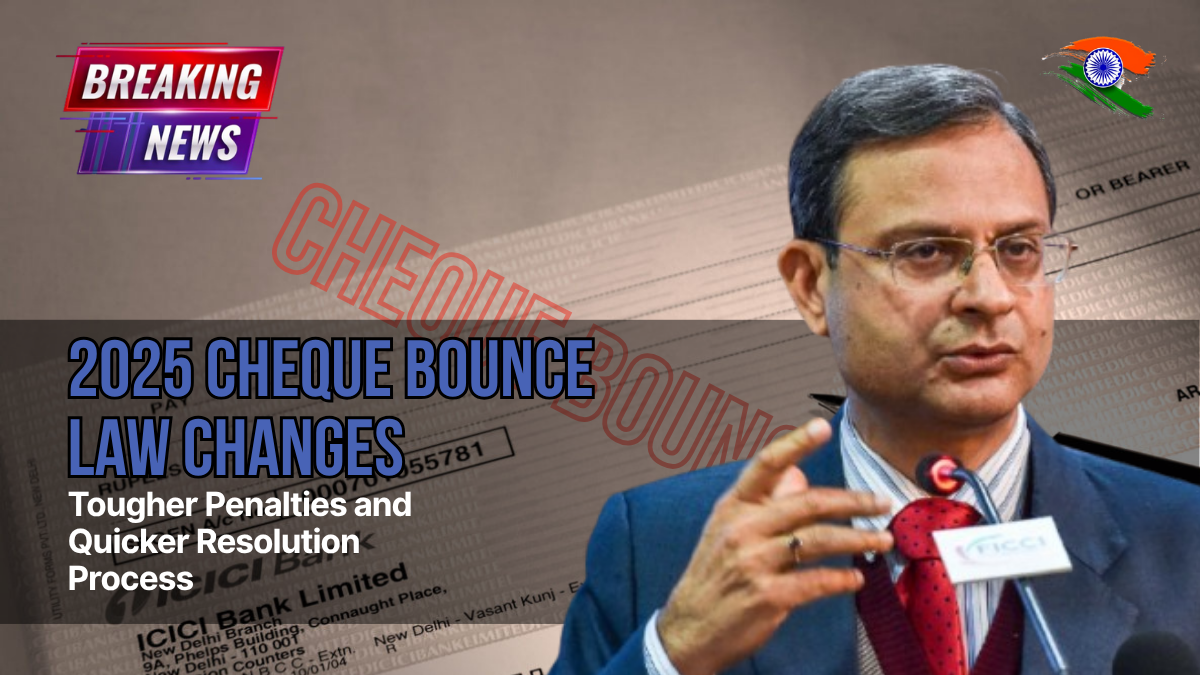Cheque transactions remain a cornerstone of India’s financial landscape, utilized by businesses and individuals alike for a wide range of payments. Recognizing the persistent challenges around cheque dishonouring and its impact on the financial system, the Reserve Bank of India (RBI) has announced new, stricter cheque bounce rules effective from 2025. These changes aim to reduce fraud, streamline the complaint process, and promote transparency and responsibility among cheque users.

Summary of Cheque Bounce Rules 2025
| Key Update | Details |
|---|---|
| Increased Jail Term | Up to 2 years for deliberate cheque bounce |
| Higher Monetary Penalty | Fines up to twice the cheque amount |
| Digital Complaint Platform | Online portal for easier complaint filing |
| Notification by Banks | SMS and email alerts within 24 hours of bounce |
| Positive Pay System (PPS) | Mandatory for cheques above ₹2 lakh |
| Repeat Offender Rule | Temporary account freeze after 3 bounces |
| Technical Errors Exempted | No penalties for bounces due to banking/technical issues |
| Official RBI Website | https://www.rbi.org.in |
Why the New Rules?
Cheque bounce incidents not only disrupt transactions but also erode trust in the banking system. With digital payment systems gaining popularity, cheques still play a vital role in formal transactions, especially in small and medium enterprises (SMEs). However, frequent misuse and cheque dishonouring due to insufficient funds or deliberate defaults have necessitated a more robust regulatory approach. The new rules are a step towards establishing a more disciplined, secure, and efficient banking environment.
Tougher Penalties for Deliberate Defaulters
One of the most significant changes in the 2025 guidelines is the enhanced penalty structure for individuals or businesses that issue cheques without ensuring sufficient funds:
- Increased Jail Term: Under the revised rules, wilful defaulters can now face imprisonment of up to two years, an increase from the earlier one-year cap.
- Hefty Fines: The fine can go up to twice the cheque amount, sending a strong message to those who issue cheques irresponsibly.
- Exceptions: Penalties will not apply in cases where the cheque has bounced due to technical glitches or banking system errors.
Faster Resolution Through Digital Complaint Filing
To improve the efficiency of handling cheque bounce complaints, the RBI has introduced a dedicated digital platform where affected parties can:
- File complaints online without needing to visit a bank branch or legal authority initially.
- Enjoy a longer window for complaint submission, giving victims ample time to pursue necessary legal action.
- Receive updates through a streamlined digital interface, reducing paperwork and bureaucratic delays.
Additionally, banks are now required to notify customers via SMS and email within 24 hours of a cheque being dishonoured. This ensures immediate awareness and allows parties to act promptly.
Mandatory Positive Pay System (PPS) for Higher-Value Cheques
The Positive Pay System (PPS) is designed to enhance the security of high-value cheque transactions. Here’s what the new rules stipulate:
- Mandatory for cheques above ₹5 lakh, ensuring that the cheque details submitted at the time of issuance are verified before the cheque is cleared.
- Many banks have proactively lowered the PPS threshold to ₹2 lakh to increase coverage and reduce fraud.
The process involves the cheque issuer submitting essential cheque details (date, payee name, amount) to the bank before issuance. These details are then cross-verified at the time of presentment. Any mismatch leads to rejection, significantly reducing fraud risk.
Repeat Offenders May Face Account Freezes
In a landmark move to deter habitual defaulters, the RBI has introduced a rule targeting repeat offenders:
- If an account experiences three consecutive cheque bounces, the bank is authorized to temporarily freeze the account.
- This measure is intended to encourage responsible usage of cheques and prevent systemic abuse.
- The freeze may be lifted upon internal review and satisfactory assurance from the account holder about future compliance.
This rule is particularly aimed at businesses or individuals with a pattern of non-compliance, offering banks a strong mechanism to enforce cheque discipline.
Implications for Businesses and Individuals
For Individuals:
- Increased legal accountability
- Need to monitor account balances more closely
- Greater incentive to use digital payments for transparency
For Businesses:
- Ensures better financial discipline among vendors and clients
- Encourages formal dispute resolution
- Helps in streamlining accounts receivables with better compliance
Legal and Operational Compliance
To stay on the right side of the law, businesses and individuals must:
- Maintain accurate records of issued and received cheques
- Submit cheque details through PPS for all high-value transactions
- Respond promptly to any dishonour notifications
- Consult legal advisors or compliance officers to stay updated on new banking regulations
Frequently Asked Questions (FAQs)
1. What is the new jail term for cheque bounce under the 2025 rules?
A. The jail term has been increased to a maximum of two years for willful cheque bounce offenses.
2. Is the Positive Pay System mandatory for all cheques?
A. No, PPS is currently mandatory for cheques above ₹2 lakh, but banks may enforce lower thresholds.
3. How soon will I be notified if a cheque I issued bounces?
A. You will be notified via SMS and email within 24 hours by your bank.
4. Can my account be frozen for repeated cheque bounces?
A. Yes, after three consecutive bounces, your account may be temporarily frozen by the bank.
5. Where can I file a complaint if my cheque is dishonoured?
A. You can file a complaint using the RBI’s digital complaint portal, details of which are available on their official website.
Conclusion
The Cheque Bounce Rules 2025 bring much-needed clarity and strength to the financial regulatory framework in India. Through harsher penalties, streamlined complaint mechanisms, and increased use of digital verification systems, these rules aim to foster trust and accountability in cheque-based transactions.
Whether you are a business issuing hundreds of cheques monthly or an individual relying on cheque payments occasionally, understanding and following these rules is essential. Adhering to these new norms will not only ensure smoother transactions but also protect you from unintended legal complications.
For more details, always refer to the official RBI website.
Click here to know more



